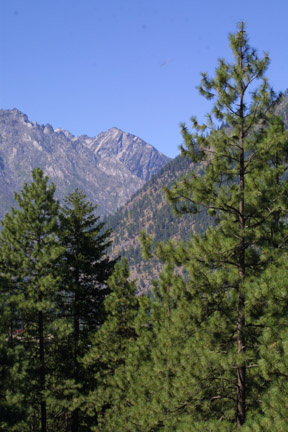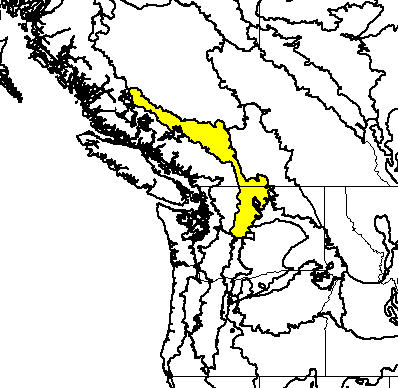
Ponderosa pines near Leavenworth, Wahington (c) 2005 Carol and Steve Baskauf
Bioimages home (click on an image to enlarge)
view
this page in its intended navigation context
Cascade Mountains leeward forests
(WWF
ecoregion NA0507)

Ponderosa pines near Leavenworth, Wahington
(c) 2005 Carol and Steve Baskauf

Source of bioregions data:
Olson, D. M. and
E. Dinerstein. The Global 200: Priority ecoregions for global conservation. (PDF
file) Annals of the Missouri Botanical Garden 89:125-126.
Distinctiveness (1=highest,4=lowest): 4
(nationally important)
Large predators including grizzly bear are still found in this ecoregion..*
Conservation Status (1=most endangered, 5=most
intact): 4 (relatively stable)
70% of habitat remains as intact habitat. Logging, grazing, and
fragmentation by transportation corridors are threats.*
 | Picea engelmannii | (Engelmann spruce) |
 | Abies lasiocarpa | (subalpine fir) |
 | Pinus contorta | (lodgepole pine) |
 | Pinus contorta | (lodgepole pine) |
 Populus
tremuloides (quaking aspen)
Populus
tremuloides (quaking aspen) | Picea glauca | (white spruce) |
 | Pseudotsuga menziesii | (Douglas fir) |

 Pinus ponderosa
(ponderosa pine
Pinus ponderosa
(ponderosa pine | Agropyron spp., e.g. Agropyron spicatum (Pseudoroegneria spicata ssp. spicata) | (wheatgrass) |
 | Artemisia tridentata | (big sagebrush) |
Views from habitats in the ecoregion


mixed conifer forest,
Icicle Canyon, Wenatchee Ntl. Forest, Washington
(c) 2005 Carol and Steve Baskauf
hires
hires



riparian area, Icicle Creek, Wenatchee Ntl.
Forest, Washington
(c) 2005 Carol and Steve Baskauf
hires
hires
hires



treeline forest, Washington Pass, Okanogan Ntl.
Forest, Washington
(c) 2005 Carol and Steve Baskauf
hires
hires
hires



dry south-facing slope, Okanogan Ntl. Forest,
Washington
(c) 2005 Carol and Steve Baskauf
hires
hires
hires

spruce killed by spruce bud worm, Okanogan Ntl.
Forest, Washington
(c) 2005 Carol and Steve Baskauf
hires
* Ricketts, T.H., E. Dinerstein, D.M. Olson, C.J. Loucks, et al. (1999) Terrestrial Ecoregions of North America: A Conservation Assessment. World Wildlife Fund - United States and Canada. Island Press, Washington, D.C. pp. 337-340.
Except as noted, images copyright 2002-2005 Steve Baskauf - Terms of use